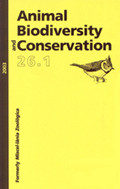An indirect assessment of the effects of oil pollution on the diversity and functioning of turtle communities in the Niger Delta, Nigeria
Article Sidebar

Main Article Content
L. Luiselli
G. C. Akani
There are many documented cases of oil spillage in the Niger Delta region, southern Nigeria (West Africa). Due to both habitat characteristics and omnivorous habits, the freshwater turtles are important vertebrates species in the trophic chain. They are therefore considered to play a significant role as ecological indicators for areas subjected to oil spillage events. The aim of this study was to evaluate the effects of oil spillage and consequent pollution on the abundance, complexity and functioning of freshwater turtle communities of the Niger Delta, by comparing the turtle fauna found in two areas with similar environmental characteristics, one unpolluted and the other polluted by a case of oil spillage in 1988. A total of 510 turtle specimens belonging to four different species (Trionyx triunguis, Pelusios castaneus, Pelusios niger, and Pelomedusa subrufa) were captured in the unpolluted area, whereas 88 specimens, from two different species (P. castaneus and P. niger) were captured in the polluted area. The dominant species was P. castaneus followed by P. niger in the unpolluted area, and P. niger in the polluted area. A marked shift in habitat use was observed in one species (P. niger) after the oil spillage event. This study revealed both direct and indirect effects of oil pollution on the complexity and habitat use of Nigerian freshwater communities of turtles. The main direct effect was a considerable reduction in the specific diversity of the turtles; 50% of species were lost after oil spillage and there was a very strong decline in the numbers of turtle specimens also for those species which were able to survive the catastrophic pollution event. The shift in habitat use after oil spillage by P. niger may have a significant effect on the long–term persistence of this species, independently of the pollution effects of the oil spillage event, because it considerably reduced habitat niche separation between this species and the closely related P. castaneus, a potential competitor. It is therefore stressed that eco–ethological modifications in populations of animals subjected to catastrophic events such as oil pollution should be taken into account when evaluating the long–term effects of these devastating phenomena.
Article Details
How to Cite
Luiselli, L.; and Akani, G. C. “An indirect assessment of the effects of oil pollution on the diversity and functioning of turtle communities in the Niger Delta, Nigeria”. Animal Biodiversity and Conservation, vol.VOL 26, no. 1, pp. 57-65, https://raco.cat/index.php/ABC/article/view/57476.
Rights
Copyright
The authors retain copyright and grant the journal the right of first publication, with the work available simultaneously under a Creative Commons attribution license that allows sharing of the work with third parties, as long as they recognize authorship and the initial publication in this journal.
Most read articles by the same author(s)
- G. C. Akani, O. K. Ogbalu, L. Luiselli, Life–history and ecological distribution of chameleons (Reptilia, Chamaeleonidae) from the rain forests of Nigeria: conservation implications , Animal Biodiversity and Conservation: Vol. 24 No. 2 (2001)
